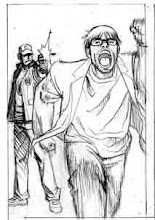The two worlds, the divine and the human, can be pictured only as distinct from each other - different as life and death, as day and night. The hero adventures out of the land we know into darkness; there he accomplishes his adventure, or again is simply lost to us, imprisoned, or in danger; and his return is described as a coming back out of that yonder zone. Nevertheless - and here is a great key to the understanding of myth and symbol - the two kingdoms are actually one. The realm of the gods is a forgotten dimension of the world we know. And the exploration of that dimension, either willingly or unwillingly, is the whole sense of the deed of the hero. The values and distinctions that in normal life seem important disappear with the terrifying assimilation of the self into what formerly was only otherness.
How teach again, however, what has been taught correctly and incorrectly learned a thousand thousand times, throughout the milleniums of mankind's prudent folly?
The first problem of the returning hero is to accept as real, after an experience of soul-satisfying vision of fulfillment, the passing joys and sorrows, banalities and noisy obscenities of life. Why re-enter such a world? Why attempt to make plausible, or even interesting, to men and women consumed with passion, the experience of transcendental bliss?
The equating of a single year in Paradise to one hundred of earthly existence is a motif well known to myth.
Master of the Two Worlds
Freedom to pass back and forth across the world division, from the perspective of the apparitions of time to that of the causal deep and back - not contaminating the principles of the one with those of the other - is the talent of the master.
Symbols are only the vehicles of communication; they must not be mistaken for the final term, the tenor, of their reference.
The individual, through prolonged psychological disciplines, gives up completely all attachment to his personal limitations, idiosyncrasies, hopes and fears, no longer resists the self-annihilation that is prerequisite to rebirth in the realization of truth, and so becomes ripe, at last, for the great at-one-ment. His personal ambitions being totally dissolved, he no longer tries to live bt willingly relaxes to whatever may come to pass in him.
Freedom to Live.
The battlefield is symbolic of the field of life, where every creature lives on the death of another. A realization of the inevitable guilt of life may so sicken the heart that...one may refuse to go on with it. On the other hand, like most of the rest of us, one may invent a false, finally unjustified, image of oneself as an exceptional phenomenon in the world, not guilty as others are, but justified in one's inevitable sinning because one represents the good. Such self-righteousness leads to a misunderstanding, not only of oneself but of the nature of both man and the cosmos. The goal of the myth is to dispel the need for such life ignorance by effecting a reconciliation of the individual consciousness with the universal will. And this is effected through a realization of the true relationship of the passing phenomena of time to the imperishable life that lives and dies in all.
Man in the world of action loses his centering in the principle of eternity if he is anxious for the outcome of his deeds, but resting them and their fruits on the knees of the Living God he is released by them, as by a sacrifice, from the bondages of the sea of death.

No comments:
Post a Comment